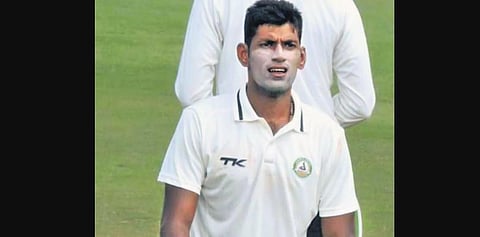

CHENNAI: Akshay Wakhare is a veteran in the domestic circuit. The tall, off-spinner is in the November of his domestic career. It’s spanned 16 seasons. During that time, he even bowled Vidarbha to two successive Ranji Trophy titles in 2018 and 2019. Two months back, Wakhare, like many other domestic cricketers in India, received multiple calls from player agents in the UK to check his availability to in the local leagues there.
After deliberation, Wakhare decided against travelling as it would mean he would have to leave his five-month-old kid and wife alone at Nagpur, among the worst affected Covid-19 cities in India. “It was important for me to go there, because I would be able to get some money to run the family and pay the EMIs. But if I go, my kid and wife will be here. So I didn’t want to take that risk,” Wakhare says.
While the pandemic has left scars that would take decades to heal, he belongs to the tribe badly hit by lack of financial income. The pandemic meant the BCCI couldn’t host its premier domestic tournament – Ranji Trophy for the 2020/21 season. While cricketers with IPL contracts continued to survive, the stories of the players who only feature in the three top-tier domestic meets — Ranji, Syed Mushtaq Ali and Vijay Hazare — is different.
After a year’s gap, most of them received their first cheques (match fees) from the BCCI a couple of weeks ago courtesy the recently concluded SMA T20s and Vijay Hazare. “It isn’t big money, but something is better than nothing. Ranji Trophy is what feeds us for 12 months. Without that, our major income is gone,” Wakhare says. It is a common story among most domestic cricketers including the ones playing for Saurashtra, the defending Ranji champions. “We may have won Ranji Trophy twice, but getting a job through cricket is still far-fetched for us. We come from Tier II cities, where opportunities are also minimum,” he adds.
For the majority of India’s domestic cricketers, the game remains their bread and butter. Ajay Vohra (name changed on request) is one of those who took the decision to travel to the UK. While it is common for many cricketers from India to do so, what is striking this time is his pay. “I get 150 pounds for a week,” Vohra says. “I’m taking it happily because it was my first income for over a year. I’ve a mother and wife to take care of. I couldn’t do anything else back home, so I came here. Although most of my earnings go towards food, I can still send something back home. If I don’t take care of them, who will? Now, at 27, I don’t know where my career is headed,” Vohra says.
So is the BCCI short on finance? No. Why have they not paid domestic players? The reason is a combination of factors. The domestic players have not received the gross revenue that the BCCI distributes to them every year after passing the accounts in the annual general body meeting. Since 2018, this amount hasn’t been paid, forcing players to live only on match income. The Supreme Court-appointed Committee of Administrators couldn’t hold the AGM for two years. And when the newly elected office-bearers took over, they sought time to pass the accounts during their first AGM in 2019. There was another AGM in 2020, but still, there is no development on that front.
As a result, many have been exploring the possibility of playing league cricket in the UK for survival. Steven Hirst, who is managing director at CricX — a player exchange agency — says he has been receiving requests from many Indian domestic cricketers to ply their trade in UK, Australia and New Zealand. “There has been plenty of requests. Since the pay is low, only a few — who are really struggling — have taken up the offer. It is common for Indians to come here and play so they go back home prepared. They usually come here for enhancing their game, this time their preferences are different. Had the UK not placed India under a travel red-list, more would have come here,” says Hirst.
The uncertainty in payments has only made life difficult for the players who have to handle EMIs and also take care of medical expenses. “Ganguly Sir told he would pay us a year back. But we haven’t heard anything from them after that. Since he happens to be a former captain, we hoped he would know our difficulties and help us. Some of us are taking loans, but without knowing when we would get our due, it is hard to commit to banks. Those who play IPL are taken care of. But who will take care of us?” Wakhare asks.